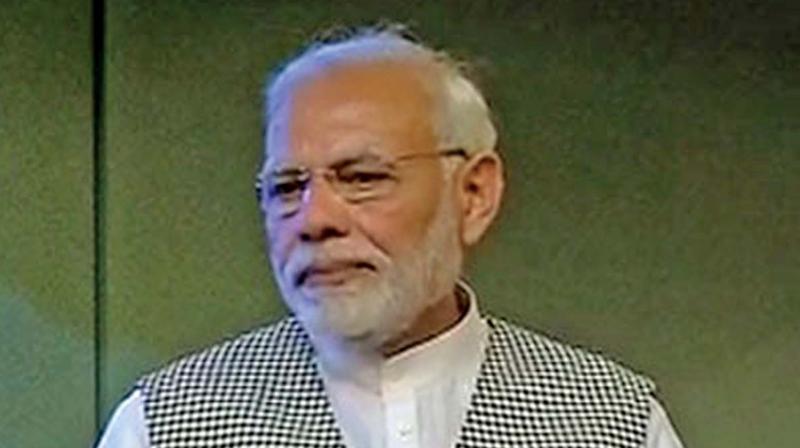BJP arrogance busted, Cong learns deference

The arrogant belief of the BJP that it was electorally unassailable and that money power could turn any defeat into a victory has taken a knock in Karnataka. Party president Amit Shah’s swagger henceforth is bound to be more pretence than real. The events of Karnataka have also dented the image of Prime Minister Narendra Modi as a “finisher” — the star batsman who comes in towards the end of the match and scores quickly in a high-pressure situation to deliver victory to his team. He fell short in Karnataka. The impact of this will not be limited to one state. The BJP needed to turn the outcome in its favour to send two signals. One, that it can attract the requisite numbers should it face a similar shortfall in the 2019 general election. Two, that it remains unassailable under the leadership of the Modi-Shah duo. Its failure has suddenly made it vulnerable in the public mind.
After the event, people will begin to wonder whether the BJP might fall short of a majority in 2019 and its subsequent options. Its re-election will not be taken for granted. Within the BJP doubts will also arise about the ability of the Modi-Shah duo to deliver victory. As it is, at an individual level, both are resented as neither possesses a likeable persona. Their intimidating personalities and arrogant body language were tolerated largely as they managed electoral victories. This is likely to change in the run-up to 2019. Mr Modi is given to making tall, unrealistic and astounding claims about his abilities and attributes. Public incredulity about these claims is not something that he can easily work with. And increasingly, the public has begun to disbelieve the narrative he has spun. He is seen as an uneducated, glib liar who constantly shifts the blame for his government’s shortcomings to others, mostly on to the shoulders of tall historical figures long since dead.
This is the first time that the Modi-Shah duo has been outsmarted by their political rivals. Goa, Manipur and Meghalaya had shown that it did not matter who won the election because the BJP could always cobble together the numbers and grab power. That pattern has been broken. This is, therefore, an unprecedented setback for them in the run-up to the general election. It would be a mistake, however, to conclude from the Karnataka events that money power has lost influence in government formation. The fate of the BJP was only sealed the moment the Supreme Court checked the misuse of discretion by an openly partisan governor, Vajubhai Vala. Instead of allowing a leisurely 15 days to bribe potential defectors from the Congress and the Janata Dal (Secular), it set a 24-hour deadline for proving its majority. Since the elected rival MLAs were already quarantined and incommunicado, the machinations of Messrs Shah and company were thwarted.
So this was no ideological victory for the Congress and the JD(S). The offer of loaves and fishes did not work because there was no time for negotiations and the fear of attracting disqualification for defection. Defecting MLAs might not have had the appetite for another election quite so soon. More than the political parties, it is the Supreme Court that has redeemed itself after a series of misadventures. It must be thanked for saving Indian democracy by shielding it from the vagaries of money power. But it remains to be seen in the course of ongoing hearings whether it circumscribes the discretionary powers of governors.
Karnataka also augurs well for Opposition unity. Opposition unity had already been initiated by the coming together of the Samajwadi Party and Bahujan Samaj Party in the Phulpur and Gorakhpur Lok Sabha byelections in Uttar Pradesh. For all practical purposes, the intent of the Opposition parties to mount a unified challenge to the BJP in 2019 was already there. What Karnataka has proven is that if the Opposition works in unison and is on the ball, it is more than a match for the BJP.
There is a lesson in Karnataka for the Congress — that it should be ready to subordinate itself to regional parties to defeat the BJP. That a depleted Congress with a shrinking geography is not going to be the magnet for Opposition unity has been clear for quite some time. It may now be more willing to work in with other Opposition parties to keep the BJP out in 2019, without laying claim to leadership as a precondition. The new strategy will be tested a few months from now in Rajasthan, Madhya Pradesh, Chhattisgarh and Mizoram. Although the Congress is the main challenger in these states, it would be a mistake for it to ignore the other anti-BJP Opposition parties, taking into account the consolidation of dalits, Other Backward Castes and Muslims on the ground. However small they may seem to the Congress, which still pretends to be a giant, it would have to take on board whichever political forces represent them before the election.
This is not going to be an easy task for a party convinced that it is on the verge of returning to power in Rajasthan and perhaps even in Madhya Pradesh and Chhattisgarh. If it makes the same mistake to fight the elections alone, as it did in similar circumstances in Karnataka, it may come to rue that decision. Only if it shows generosity and accommodation towards others in the Opposition will the Congress be able to stand together at the national level with any anti-BJP political formation. After Karnataka, the BJP will also have appreciated the importance of investing in social coalitions for 2019. Under the Modi-Shah leadership, the BJP does not attract allies very easily. Their leadership lacks the collegiality and communication skills necessary to keep their allies happy. They rely instead on the crumbs falling off the table to keep them satisfied. And yet, having witnessed the Karnataka debacle, the BJP may spring a few surprises.

